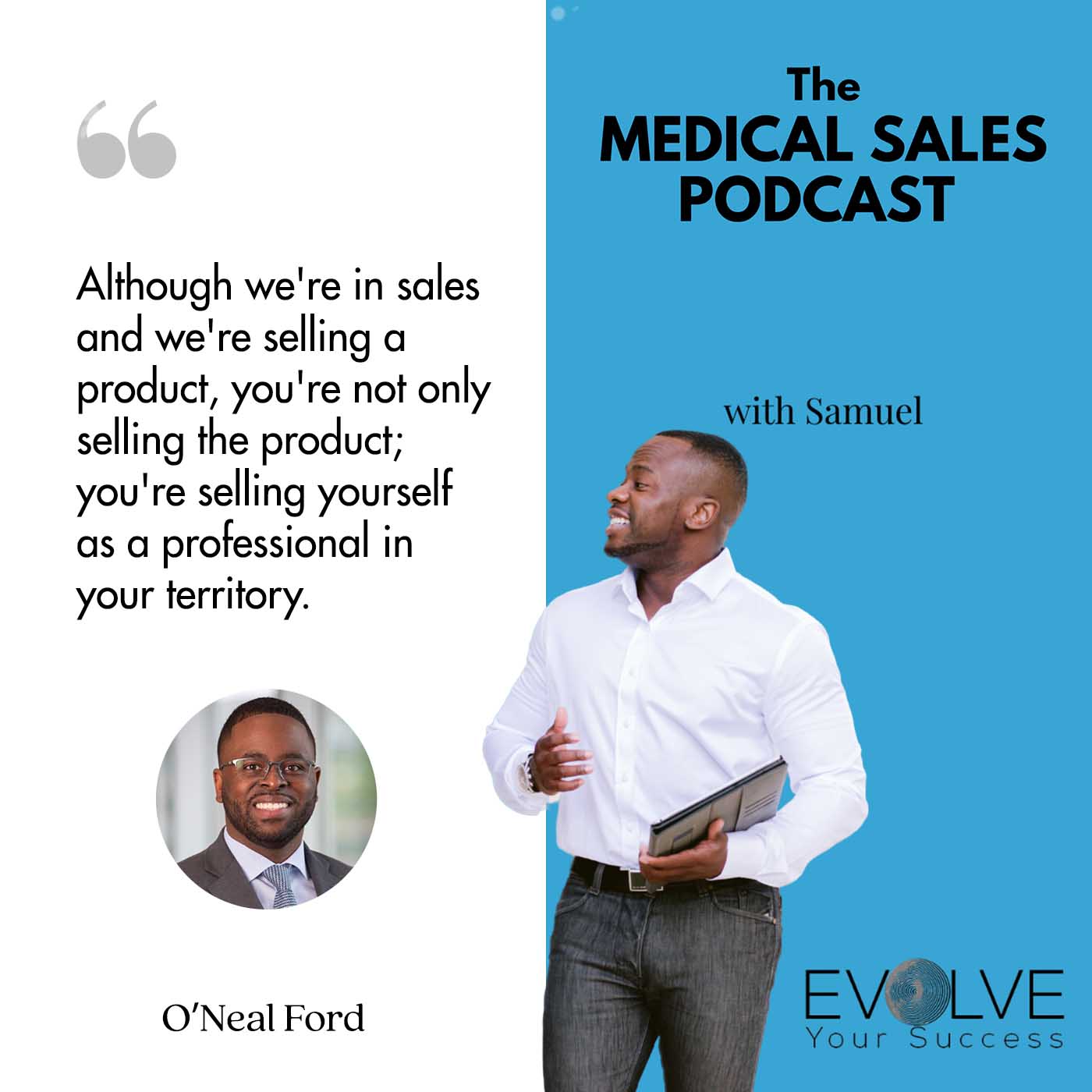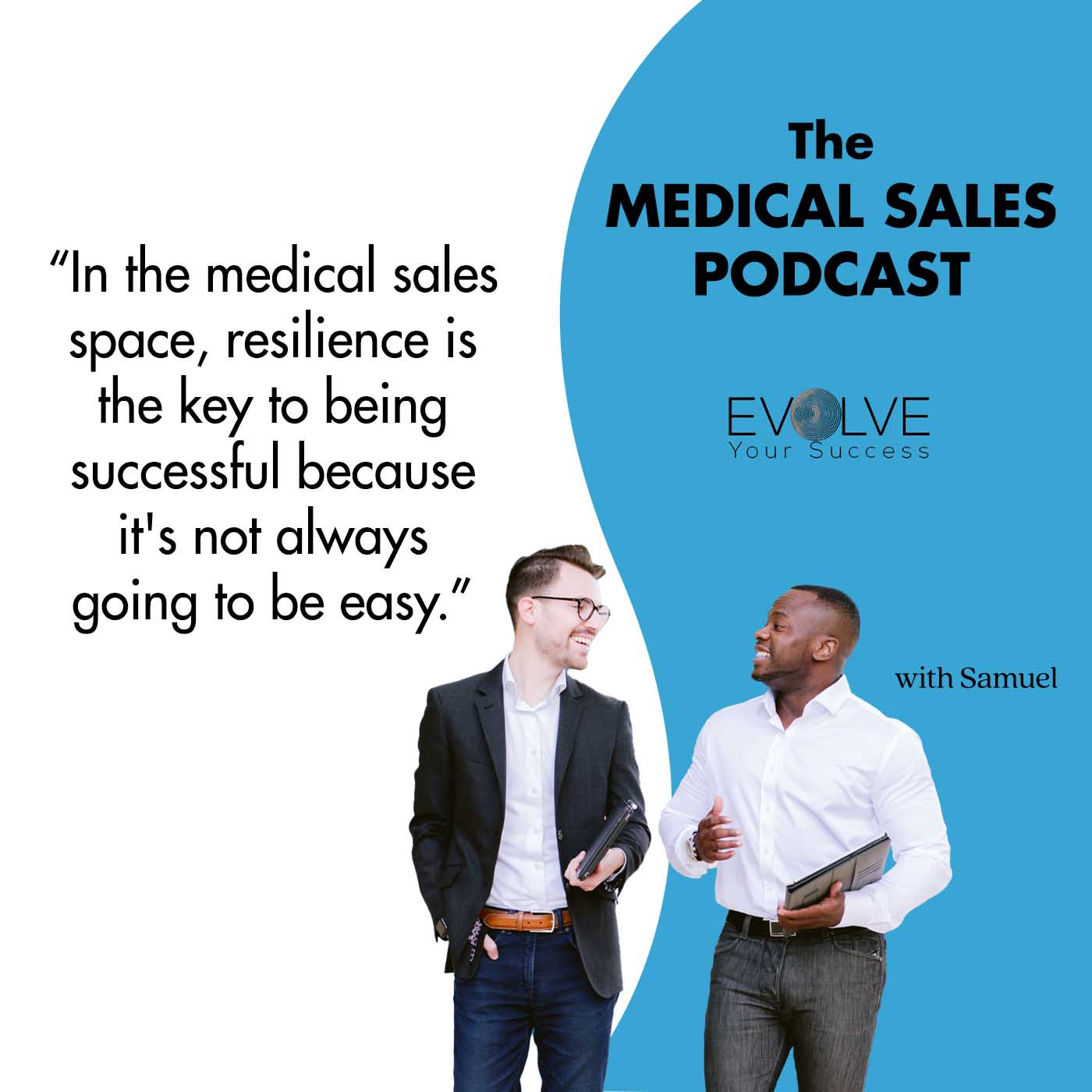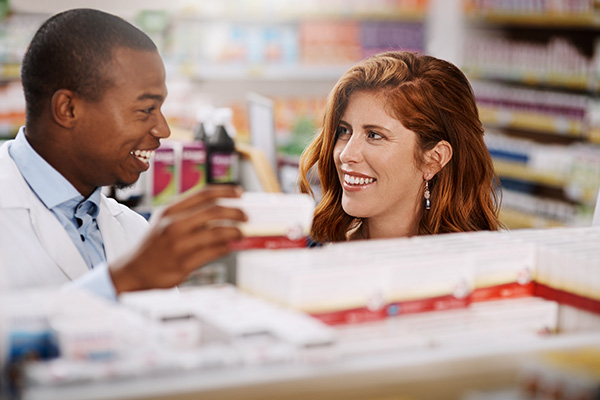In the dynamic realm of medical device sales, the possibilities are limitless. Dive into the role of a Diabetes Sales Specialist and explore the diverse opportunities that await. In this episode for Black History Month, Samuel Adeyinka interviews District Sales Trainer & Diabetes Sales Specialist, O’Neal Ford, to shed light on his role. Discover the importance of curiosity and adaptability in the field as O’Neal discusses the evolving landscape of endocrinology and the impact of technology on glucose monitoring. Gain valuable insights into O’Neal’s journey, his role as a district sales trainer, and his passion for transformative products. If you’re considering a career in medical sales, especially in the diabetes specialty, this episode offers essential perspectives and inspiration. Tune in for a deep dive into the dynamic world of medical sales!
The CE experience for this Podcast is powered by CMEfy – click here to reflect and earn credits: https://earnc.me/BteYxy
—
Watch the episode here
Listen to the podcast here
What Is A Diabetes Sales Specialist? With O’Neal Ford
We have with us another special guest. He goes by the name of O’Neal Ford. He is a diabetes sales specialist and sales trainer for a very large medical technology company in the nutritional division. This is one of those episodes where you’re going to learn something about a field that you might want to consider getting into. As always, we do our best to bring you guests that are doing things a little differently in the medical sales space. I will not say anymore. I’ll let you enjoy the interview and I do hope you enjoy this interview.
‐‐
O’Neal, how are you doing?
I’m doing well. How are you?
I’m fantastic. Why don’t you tell the audience who you are and what you do?
I’m a diabetes sales specialist and district sales trainer.
Break it down for us. Are diabetes sales specialists falling into the realm of pharma or med devices? Give us a little bit more understanding about that role.
This role particularly falls under a med device endocrinology space. Primarily, we have a product on the market that supports patients that are managing their diabetes where they have type 1 or 2 to help them make better clinical decisions when they’re managing their therapy.
Is it you and a team? Is it you and a territory? Are you the only guy out there? How is it set up?
In my current role, now I work with another rep in my territory, in the Pacific Northwest region. There are two different call points. Primarily, I’m a diabetes health specialist. I call on endocrinologists and endocrine specialists generally. My colleague calls on primary care providers. We share the same product but we have different call points generally.
It’s all around glucose monitoring, the devices. It’s interesting to see that you’re also a district sales trainer. Tell us a little bit about what that means as far as your role as a diabetes specialist.
There are two components primarily, being the diabetes sales specialist, I’m in the field meeting with customers, differentiating the product versus the competitor, getting providers to use their product as the DST position or the Diabetes Sales Trainer, the district sales trainer. Essentially, I am the conduit to new training initiatives and the territory for my colleagues that cover the Pacific Northwest. If there’s new individuals that are added to the team, I have a touch point to support them as they’re being onboarded. The individuals that are currently on the team, I help support my manager as well as the sales team to enroll new initiatives.
Does that mean you’re helping conduct interviews for new hires and things like that?
I don’t do an interview, onboarding or any of that. I support new hires after they’re selected.
Strictly training. Let’s talk about it then. Since you’re an IV sales specialist and a sales trainer, you would absolutely have some ideas on what makes a great sales rep, but let’s be very specific about it. You are on a med device. You are calling an endocrinologist. Are you ever in cases? Is this strictly in the office? Give us the rundown.
Primarily, the endocrinologist that I meet, I meet them in their office. I have a territory that spans primarily the most of Western Washington down to like the Portland, Oregon area. There’s a couple of touch points that vary from endocrinologists as well. Endocrinology primarily is my main call point. In between endocrinology and primary care providers, there’s an array of different providers that manage type 1 and 2 diabetes.
In general, there’s the CDCS providers. Those are the diabetes education specialists. They’re not primarily endocrinologists. They can be pharmacists, physician’s assistants, nurses call them as well in their office and then also support other ambulatory care practices, primarily pharmacy practices, primary care practices in between those two major call points.
You’re not ever going to the hospital? This is all office based.
This is primarily office space in the endocrinology clinic. In some cases, some of the clinics are inside of those larger hospital buildings, but essentially they’re all clinics usually outside of the hospital health system type of environment.
How long have you been doing this?
I’ve been in this particular position in the diabetes space for a few years prior to being in the diabetes space, I worked in a different division of the company in nutrition where I had a much larger territory and sold different nutrition products to pediatric gastroenterologists.
Would you then say that your day starts at 8:00 and ends at 5:00, or is it different?
I try to make long days. I believe that sometimes it depends on the call point. The morning may be better. The evenings may be better. I generally utilize the entire day from 8:00 to 5:00 to meet with customers. The majority of that entails meeting with them in offices, educating them and giving them the resources that they need.
[bctt tweet=”The majority of the time meeting with customers entails educating them and giving them the resources that they need.” via=”no”]
How often would you say you’re working outside of work hours?
It varies. If I have a speaker program or dinner program that’s later in the evening, I tend to do those a lot. I would say about a little bit more than what I’m normally expected of. It ebbs and flows depending on what I have going on in the territory. I try to do out of the box approaches to meet the provider. It changes over time.
It sounds like your role almost mirrors a biotech or pharmaceutical sales role. Would you agree with that?
I agree.
Let’s talk about it then. You have one person on your team. You’re a team of two and you guys manage the entire territory.
Inside of a larger district with other reps as well.
What are the top three things that allow that you’ve see that for as long as you’ve been in the role that have helped you become successful?
I found new to sales within the last few years, when I transitioned into this role, it was a considerable amount of learning and figuring out a way to 1) Become a great salesperson, but then also identify how to move business to my territory. There are three things particularly that I learned that have been beneficial. 1) Be very curious and be open-minded to new experiences. What I mean by that is there’s more than one way to sell to multiple providers. Finding what works best for you but not being completely set in that particular way. because it may not suffer for some of your customers.
In addition to that, being dynamic and being flexible, understanding, being in the territory and out in the field, requires you to do what the customer needs you to do and be there when they need you to be there. Have an open mind. Be in control and understand that you’re in control of your business. The third thing is that you are in an entrepreneurial type of position as a salesperson. Ultimately, what’s going to grow your business is being in full control, understanding where your business is, understanding what moves your business, and being willing to go back to the drawing board and come up with new initiatives in addition to what your company is ultimately telling you to do.
We talk to a lot of professionals. For professionals that want to get into medical sales, you have the one that knows exactly what they want. You have the one that thinks they know what they want and then you have the people that have no idea. They’ve heard of med devices and pharma. Let’s pretend you’re talking to them right now and they’re reading this episode and someone is trying to figure out where they should be. What would you tell them as a potential invitation to your field? What would you share with them that they need to be able to do or they should definitely think about or if they’re considering being where you are, these are the things that matter.
The first thing I would say is to understand where you are with your competencies that translate into a sales position. Particularly, if you were to come into this position. Everyone has their unique skillset and although we’re in sales and we’re selling a product, you’re not only selling a product, you’re selling yourself as a professional in your territory. What I mean by that is understand what you do well, understand what your strengths are, your great communicator. Highlight those communication skills. If you’re someone who’s a great relationship builder.

Find opportunities to build relationships and nurture those relationships. Be in tune with what you have to offer, particularly in chronology space, there’s an immense amount of call points. What I mean by that is that you have to be able to tailor your messaging and how you present yourself to multiple different individuals with different competencies and points in the treatment spectrum. Be flexible and understand that one message doesn’t work for one individual person. You have to be able to tailor the solution to whoever you’re speaking with. I think that’ll translate well.
‐‐
If someone is a specific type of person, what type of person should stay away from what you do?
Individuals who are rigid in general, like in a sense that you’re set in your ways, you think your way is the only way. Sometimes, that may work. I hate to jump to a conclusion and say that that approach is not beneficial. From my experience meeting with people who are in sales who are meeting their goals, they’re exceeding their goals, they’re individuals who are one of their go-getters, then also they have a sense of supporting your customer and not forcing your customer. There’s a time where you get in there and drill down versus the customer, but you have to be there to support them in their practice.
They approach their customers more as a partner than anything else.
It is tailored to what works best for you, but I think that’s the best way.
Why do you love what you do or do you love what you do?
I love what I do now. I came from clinical practice before into this role and had a big opportunity to 1) Before have an impact on patients living with diabetes type 1 and 2. In this role, I find myself directly meeting with patients and having an impact on their life, but I have an opportunity to meet with the provider. I feel like I have a higher opportunity in my area to impact individuals living with type 1 and 2 diabetes. I find a lot of joy in bringing a product to market that is very beneficial to the patient. Patients love the product, it changes their life and that is the reason why I like to drive home on those late days, the 6:00 to 7:00 or 8:00 coming from a dinner program, I’m like, “I have some impact in my territory.” That’s good.

For those in the audience that might not be clear on what glucose monitoring is, give us a little science behind what it is that. What’s going on with a patient that requires your device?
Generally, when patients are living with diabetes, they’re managing their blood glucose or they’re testing their blood glucose with fingers. That’s generally how it’s been for a long time. It works for some patients. I think now that we have technology where patients can wear continuous glucose monitors and then get that information without having to prick their fingers. That’s an impactful one for patients. It’s very painful to rely on finger sticks and it is a tool that they can use in a number of ways.
As far as you, how do you make it all work? Does this job take the majority of your time? Are you able to have a social life? How do you make it all work?
The quality of life is good particularly in this position. I find myself doing my job. I enjoy being in front of my customers and speaking to them about their patients. There aren’t many days where I’m working late, but if I do it, then I enjoy it. I do have a good life outside of work. I’ve been in situations before where I didn’t have that. Now that I’m in my career I value being able to have that work life balance.
In this space, medical sales, a word is always brought up that I think everybody has to have to be successful. That’s resilience because it’s not always going to be an easy street. You’re not always going to be able to get access to that provider or even to that office and do what you need to do for that account. What’s your life philosophy that allows you to get up every day and even when things aren’t working out, still give it as much energy as if they were?

My philosophy generally is that the product that I have is impacting patients in making their lives better. I keep that at the forefront of my mind. Whenever I’m out in the territory or when I’m pre-call planning or if I’m doing anything related to work, I’m always looking for opportunities to push the bar a little bit more. What made me be so confident is understanding your product, where your product fits, product works and some of the challenges. You have that mastery of your product and you care about your product and where it fits into therapy, I think that propels you to want to do more, want to build relationships and continue to push the bar a little bit in your territory.

Is there anything else you’d love to share with the audience about why they should or should not consider diabetes specialty in med devices?
Generally, being a salesperson and being out in the field, you have to find ways to keep yourself motivated. Every day you’re going out, you’re in the field, you’re calling customers, you’re finding new ways to get in contact with customers, in this space, we have multiple customers, in multiple places they have different needs and different education competencies. You have to be dynamic and tailor your messaging to meet those customers. If you’re not someone who wants to constantly revamp things and go back to the drawing board, find what works and find what doesn’t work. It may not be the space for you. you may have to find somewhere where it’s a little bit more rigid. Every approach is the same. Every customer you have the same customer call point every time and it works that may work for you.
The last question I’ll ask regarding glucose monitoring. What’s cool about medical sales is how fast technology changes. It can be an incentive for a provider to want to get behind your product because it’s a new technology. What have you seen in the endocrinology space? Would you say that it’s a completely different world than a few years ago or is technology moving slower or faster? What’s your experience?
There’s a lot of new innovation in the endocrinology space, whether it be injectables, continuous glucose monitoring or some of the providers that are taking part in care now. I think scopes of practice are changing, new providers are coming into the space and they have new responsibilities. That’s exciting. There’s a lot of dynamic. It’s constantly moving and changing. I see that the scope of this particular field of sales continues to grow and I’m excited about that.
[bctt tweet=”The scope of this particular field of sales in endocrinology continues to grow.” via=”no”]
We have one more thing to do. It’s called our lightning round. Are you ready?
I’m ready.
I’m going to ask you four questions. First question, what’s the best book you’ve read in the last six months?
The autobiography of Rickey Henderson, the baseball player for the Oakland A’s.
I had never read that one. Was it good?
It was good. I’m not big on baseball, but I love his story of being the one of the best lead off hitters and all of those things.
I might check it out. What is the best TV show or movie you’ve seen in the last six months?
I rewatched Kirby Enthusiasm, the first few seasons. I always think that’s funny.
Best meal you’ve had in the last six months?
I’m from New Orleans. I had an opportunity to go back home, etouffee, gumbo, everything. All of that. Anything that’s from home, I love it.
Was it home cooked or is it a restaurant you went to?
It was at a restaurant.
Last question, what’s the best experience you’ve had in the last six months?
I was recently married. I think that was exciting,
Congratulations.
Thank you. From a professional perspective, the best experience that I had was being able to become the DST. You know, I’m new to sales. I came into this role quickly and adapted to it. I’m excited to have an opportunity to do more.
It was wonderful spending the day with you and talking about diabetes sales specialty and district training. We can’t wait to see all the amazing things you do with your career. Thank you for being on the show. We’ll be catching up with you later.
I love your show. Keep doing what you’re doing. I look forward to working with you in the future.
‐‐
You may have read this episode and said to yourself, “That is it. He is literally doing what I want to be doing.” You already know what I’m going to tell you. Visit EvolveYourSuccess.com, fill out an application and talk to someone who can show you how a program can change your life. Mind you, it’s going to be an interview and not everyone is selected, but if your heart’s in the right place, if your work ethic is there and you are ready to be serious, then you might have an opportunity. As always, we do our best to bring you, guests are doing things differently in the medical sales space. make sure you tune in for another episode.
Important Links
- O’Neal Ford – LinkedIn
About Dr. O’Neal Ford
 Dr. O’Neal Ford is a Diabetes Sales Specialist with Abbott Diabetes Care. O’Neal started his career in medical sales with Abbott Nutrition in 2021 as a Pediatric Specialty Nutrition Rep. Prior to transitioning into medical sales, O’Neal held various roles in community pharmacy with over a decade of experience at CVS Health. Those experiences include staff pharmacist and pharmacy manager among others.
Dr. O’Neal Ford is a Diabetes Sales Specialist with Abbott Diabetes Care. O’Neal started his career in medical sales with Abbott Nutrition in 2021 as a Pediatric Specialty Nutrition Rep. Prior to transitioning into medical sales, O’Neal held various roles in community pharmacy with over a decade of experience at CVS Health. Those experiences include staff pharmacist and pharmacy manager among others.
Love the show? Subscribe, rate, review, and share!
Join the Medical Sales Podcast Community today:



















































































